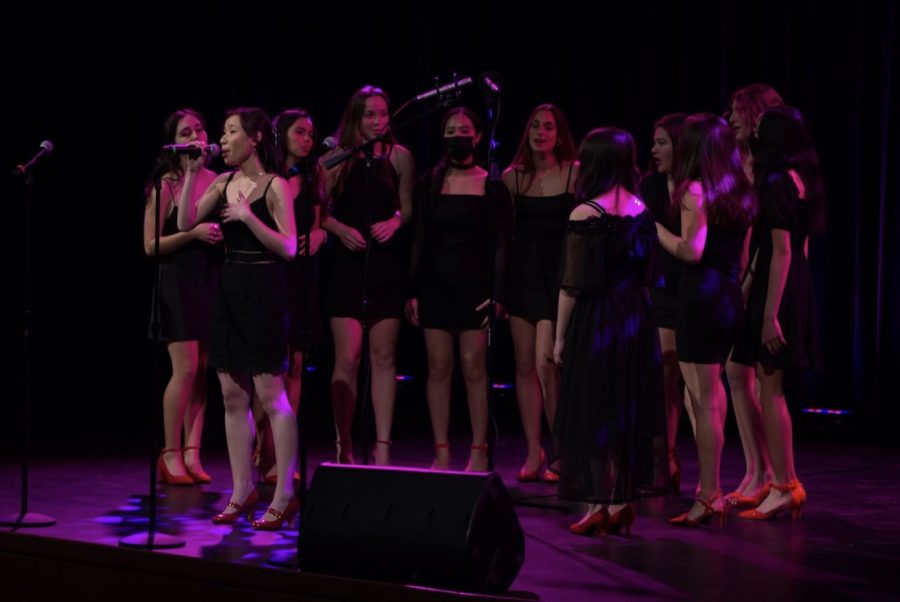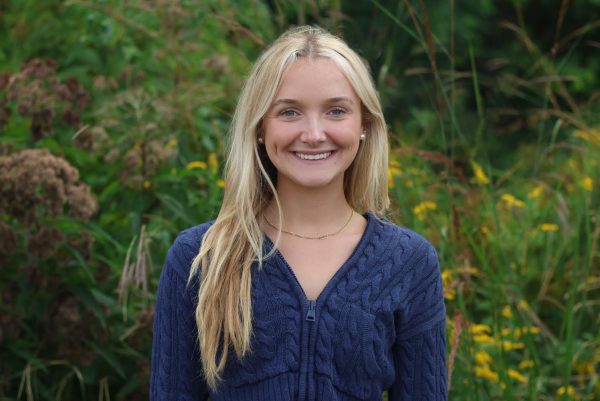All about a capella
Credit: WSPN Staff
A cappella club is a club of WHS that performs several times throughout the school year. This year, after a long audition process, 20 new members were accepted into the ensemble. There are three groups that make up the club which include: “The Madrigals,” “The T-Tones” and “The Muses.” The photo above captures one of “The Muses” concerts from last school year. This group has the tradition of wearing black dresses and red heels while performing.
October 29, 2022
Do you know the lyrics to “Twinkle Twinkle Little Star”? If so, then you can try out for Wayland High School’s a cappella club! Well, you also need the ability to sing in tune with a piano, demonstrate how high and low your voice can go and match pitches. Nevertheless, a cappella is excited to serenade WHS this year through their many vocals and performances.
A cappella is a club at WHS consisting of three separate singing groups: “The Muses,” “The T-Tones” and “The Madrigals.” The groups meet twice a week after school to practice for their performances throughout the school year. All of the a cappella groups are led by senior student directors.
Although, it hasn’t always been a trio of groups. When a cappella initially sang its way into a club at WHS in the 1960’s, there were only enough comrades to fill one group: “The Madrigals,” which got their name due to the fact that they sang traditional madrigals. Madrigals, originating in the Renaissance period in Europe, are songs that are sung simultaneously by several people without any musical instruments. It wasn’t until September of 1997 when current a cappella club advisor and director of choral arts, Rachel Carroll, began teaching in Wayland that a second singing group made up entirely of females named “The Muses” was constructed.
“After talking with the students, I learned they wanted to shift to a more modern approach to a cappella singing, so our program shifted,” Carroll said.
After being hired, Carroll also changed the audition process for the club. Before her arrival, students had to be a part of the Honors Concert Choir in order to audition for the after school activity, and they also needed to audition twice.
“They needed to audition for the Honors Concert Choir and then students in that ensemble could audition for Madrigals,” Carroll said. “But not all were accepted because it was a smaller chamber group.”
As time went on and several members of the club expressed their opinions on the extensive audition processes, Carroll decided to make auditions open to anyone who was interested. Later, Carroll took a step back, allowing the student directors to become true leaders for the ensembles.
“In talking with the student [leaders] at that time, I learned that they were looking for a more substantial role in their leadership.” Carroll said.
Four years later in 2001, three students were inspired by “The Muses” to make an all-male singing group, resulting in the formation of the “The TestosterTones,” which are now known as the “T-Tones.” Auditions were held that fall and all three singing groups were born, creating the a cappella groups of WHS today.
This year “The Muses” are led by seniors Emily Campos, Jane Gargano and Riley Leichliter. Seniors Grant Lee and Declan Murphy spearhead the “T-Tones.” “The Madrigals” are run by seniors Zach Greenberg and Ramji Ravi. The directors are chosen based on how many years they have been a part of the club and by how dedicated they are to the group.
“Being a director is going to be really exciting,” Campos said. “Choosing all the songs we do and the concerts are always so exciting.”
One of the important roles of the directors includes holding auditions for the season. Since the audition process is tedious, the directions start off the operation with crafting a rubric, or a rating system to stay organized. Together, they use the rubric to adjudicate each audition and evaluate things such as phrasing and tone.
“The directors this year decided that they wanted to keep the blind audition for the first round and then have the callback round non-blind so they could assess things such as stage presence,” Carroll said.
During the first round of auditions, the blind auditions, the contenders are directed to stand behind partitions during their tryout, eliminating bias and allowing them to solely be judged on the musical aspect of the auditions. The directors pay close attention to each voice and take notes on their rubrics throughout each listening.
“This year around 40 to 45 auditioned for the blind auditions,” Campos said. “Then we chose 25 people and those people audition a second day to see where they would end up.”
These selected 25 people stood out to the directors, so they were granted a callback audition. After this second round of auditions, the directors deliberate and look back at their rubrics, picking out which voices best blend into their current ensemble’s sound. But since there are three singing groups, there are sometimes differing opinions as to which voices would be best in each group, yet they always come to a resolution. Finally, the directors send out an email to all the auditionees and announce the club members for the year. This year a total of 20 new members were introduced.
“The hardest part of the auditions [for the directors] is that there is not enough space for everyone to be accepted into the groups,” Carroll said. “The last thing the directors want to do is discourage anyone and often students take not being called back or not being taken after a callback as a discouragement.”
Another slight challenge of the club, once it is fully up and running, is finding the time to practice. Since the club meets after school, it is burdensome for all members to attend each meeting due to the fact that most members have other extracurriculars. However, the directors often hold outside of school rehearsals which are usually at a members house.
“Students try to reserve the rehearsal times, but often there is an unavoidable conflict,” Carroll said.
Because the club meets only a few times per week, each group member has the responsibility of memorizing their parts in the performance songs in preparation for group rehearsals. The directions share the songs on GarageBand to allow each member to practice on their own time.
“You get a GarageBand and you listen to your part and then when we come together for rehearsals we just practice as a group until we all get along well together,” Campos said.
The directors choose the songs each singing group performs, yet they occasionally take recommendations from other members. The directors plan to keep the songs upbeat this year.
“It has to do with what the directors want to do specifically. Sometimes we take a poll like everyone says a song and we are like ‘this one’s good, this one’s good.’” Campos said.
For the newcomers of the club, the practice process takes a little getting used to.
“I’m honestly just looking forward to learning how to sing a song a cappella,” freshman Mia MacLean said. “I practice my song a lot and I work out my voice everyday. I have stage fright so I’m a little nervous about that.”
A cappella is all about setting other people up through song and building a community who shares the love of singing.
“I love singing with so many people of different grades, and I love being able to interact with different people,” Campos said.
Although a cappella at WHS isn’t all that is depicted to be like in dramas such as “Pitch Perfect” and “Glee,” it certainly has some of the same exciting singing elements. Carroll even hopes to implement practices that include riff-offs and improvising this year, like seen in “Pitch Perfect.”
“Those stories are more drama-pella than a cappella.” Carroll said. “Real a cappella takes a lot of practice and hard work.”
Therefore, the club has quickly begun preparation for their first performance of the year which will occur on Nov. 21, 2022.
“It’s definitely a lot of work, especially leading up to a concert, but it’s all worth it in the end,” Campos said.





![Last Wednesday, the Wayland School Committee gathered to discuss a number of topics regarding the health curriculum and Innovation Career Pathway course. Another large topic of conversation was the ways to potentially mitigate distracting cell phone usage. "These [phones] are going to distract your learning and social relationships," Superintendent David Fleishman said. "That's concrete right there."](https://waylandstudentpress.com/wp-content/uploads/2025/06/Screenshot-2025-06-04-at-9.49.31 PM-1200x886.png)



























![Troy Hoyt finishes the Boston Marathon, running for the Hoyt Foundation. T. Hoyt is the son of Hoyt Foundation CEO Russ Hoyt.
“[Running a marathon] might seem like a big thing, when it’s presented to you at first, but if you break it up and just keep telling yourself, “Yes, you can,” you can start chipping away at it. And before you know it, you’ll be running the whole 26 miles, and you won’t even think twice about it.” T. Hoyt said.](https://waylandstudentpress.com/wp-content/uploads/2025/04/C36E8761-1CBB-452E-9DF2-543EF7B1095E_1_105_c.jpeg)













































